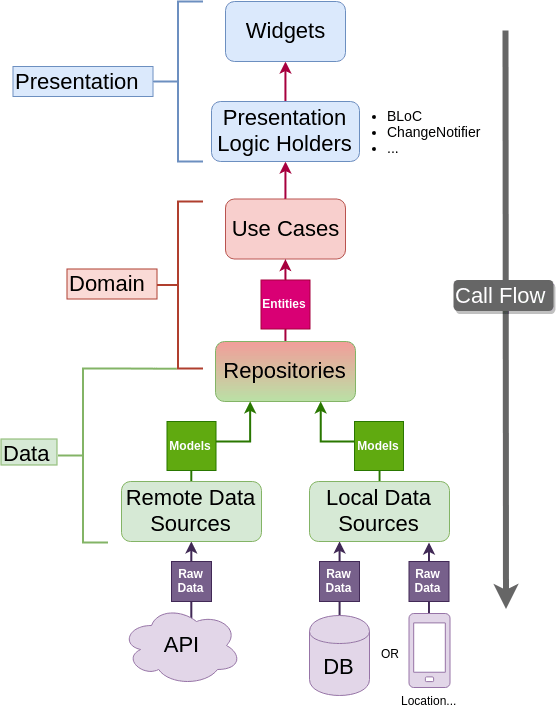This Flutter project follows the Clean Architecture pattern, which promotes separation of concerns and maintainability. The project is structured into several layers:
-
Presentation Layer: Contains widgets, pages, and presentation logic (Bloc). Handles the user interface and user interactions.
-
Domain Layer: Contains use cases and domain entities and abstract Repository.
-
Data Layer: Manages data sources, repositories, and data models. Responsible for data retrieval and storage. Divided into
repositories,model,local_data_sources, andremote_data_sources.
Our application includes a robust login system. Here are the key aspects of this feature:
-
Input Validation: We ensure that user inputs, such as email and password, are validated to maintain data integrity.
-
Authentication: Upon entering valid credentials, users are authenticated and granted access to their accounts.
Creating an account is straightforward with our signup feature. Key elements include:
-
Input Validation: Similar to the login feature, we validate user inputs to ensure data accuracy with Image file validation.
-
Create Accout: Upon entering valid credentials, users are valid to create accout.
- lib/features/Feature/
- presentation/: Contains widgets and presentation logic.
- domain/: Contains use cases and domain entities.
- data/
- repositories/: Implements data repositories.
- model/: Defines data models.
- local_data_sources/: Manages local data sources.
- remote_data_sources/: Handles remote data sources.
- flutter: The Flutter SDK.
- cupertino_icons: Provides the Cupertino icons used in the project.
- shared_preferences: A plugin for accessing and storing key-value pairs on the device.
- get_it: A service locator for dependency injection.
- dartz: A functional programming package that provides common algebraic data types and functions.
- flutter_bloc: A state management library based on the BLoC (Business Logic Component) pattern.
- equatable: A utility package for comparing objects for equality.
- dio: A powerful HTTP client for making API requests.
- formz: A package for handling form validation and state management.
- go_router: A declarative router for Flutter applications.
- mime: A package for working with MIME types.
- file_picker: A plugin for picking files from the device.
- mocktail: A mocking library for Dart and Flutter tests.
- internet_connection_checker: A package for checking internet connectivity.
In addition to the dependencies, there are also some dev dependencies used for testing and code generation:
- flutter_test: The Flutter test framework.
- mockito: A mocking library for Dart and Flutter tests.
- build_runner: A tool for generating code during the build process.
- bloc_test: A testing utility for testing BLoCs.
- network_image_mock: A package for mocking network images during tests.
